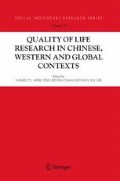Abstract
Quality-of-life in nations can be measured by how long and happy people live. This is assessed by combining data on life expectancy drawn from civil registration with survey data on subjective enjoyment of life as a whole. This measure of ‘apparent’ quality-of-life is a good alternative to current indexes of ‘assumed’ quality-of-life such as the Human Development Index. Data are available for 67 nations in the 1990s. The number of Happy-Life-Years varies considerably across nations. Switzerland is at the top with 63.0 years and Moldavia at the bottom with 20.5 years. China is in the middle with an average of 46.7. Happy lifetime has risen considerably in advanced nations over the last decade. People live longer and happier in nations characterised by economic affluence, freedom and justice. Together these three societal qualities explain 66% of the cross-national variance in Happy-Life-Years. Income equality and generous social security do not appear to be required for a long and happy life.
Paper presented at the International conference ‘Quality of Life in a Global World’ Chinese University of Hong Kong, November 14–15, 2003. This paper builds on an earlier paper entitled ‘Happy Life Expectancy’ (Veenhoven, 1996). The approach is summarized and new data are presented, now on 20 more nations and in time-trends.
Access this chapter
Tax calculation will be finalised at checkout
Purchases are for personal use only
Preview
Unable to display preview. Download preview PDF.
References
Boelhouwer, J. and I. Stoop: 1999, ‘Measuring well-being in the Netherlands', Social Indicators Research 48, pp. 51–75.
Dijkstra, G.: 2000, ‘A larger pie through a fair share? Gender equality and economic performance, Institute of Social Studies', Working Paper no. 315, The Hague, The Netherlands.
Durkheim, E.: 1897, Le suicide: Etude de sociologie (Suicide, a sociological study) (Alcan, Paris).
Estes, R.: 1984, The Social Progress of Nations (Preager, New York, USA).
Hagerty, M., et al.: 2001, ‘Quality of Life indexes for national policy: Review and agenda for research', Social Indicators research 55, pp. 1–96.
Heritage Foundation: 1999, ‘Index of economic freedom’ Internet: www.heritage.org
ILO: 1997, The Costs of Social Security: 15th International Inquiry 1990–1993 (International Labor Organization, Geneva, Switzerland).
IMF: 2000, World Economic Outlook October 2000 (International Monetary Fund, Washington, USA).
Keniston, K: 1968, Young Radicals: Notes on Committed Youth (Harcourt, New York).
Messick, R. E.: 1996, World Survey of Economic Freedom 1995–1996 (Freedom House/Transaction Publishers, London, UK).
Morris, W.N.: 1992, ‘A functional analysis of the role of mood in affective systems', in M. S. Clark (ed.), 'Emotion’ Review of Personality and Social Psychology nr 13 (Sage, New York).
Seedhouse, D.: 1986, Health: The Foundations for Achievement (Wiley, Chichester, UK).
Transparency International: 1995, TI Corruption Index. Press release, 15 June 1995, Transparency International, Berlin.
UN: 1995, Demographic Yearbook 1993 (United Nations, New York).
UNPD: 1995, Human Development Report 1995 (United Nations Development Program, Oxford University Press, New York, USA).
UNPD: 2001, Human Development Report 2001 (United Nations Development Program, Oxford University Press, New York, USA).
Veenhoven, R.: 1984, Conditions of Happiness (Reidel, Dordrecht).
Veenhoven, R.: 1991, ‘Is happiness relative?', Social Indicators Research 24, pp. 1–34.
Veenhoven, R.: 1995, ‘The cross-national pattern of happiness. Tests of predictions implied in three theories of happiness', Social Indicators Research 34, pp. 33–68.
Veenhoven, R.: 1996, ‘Happy life-expectancy: A comprehensive measure of quality-of-life in Nations', Social Indicators Research 39, 1–58.
Veenhoven, R.: 1999, ‘Quality-of-life in individualistic society: A comparison of 43 Nations in the early 1990s', Social Indicators Research 48, pp. 157–186.
Veenhoven, R.: 2000a, ‘The four qualities of life: ordering concepts and measures of the good life', Journal of Happiness Studies 1–1, 1–39.
Veenhoven, R.: 2000b, ‘Freedom and happiness: A comparative study in 44 nations in the early 1990s', in E. Diener and E. M. Suh (eds.), Culture and Subjective Wellbeing (MIT press, Cambridge, MA) USA, 2000, ISBN 0 262 04182 0, pp. 257–288.
Veenhoven, R.: 2000c, ‘Well-being in the welfare state: Level not higher, distribution not more equitable', Journal of Comparative Policy Analysis 2000, 2, pp. 91–125.
Veenhoven, R.: 2002, ‘Return of inequality in modern society? Test by dispersion of life-satisfaction across time and nations'. Paper presented at the ISA conference, Brisbane Australia July 2002.
WHO: 2001, The World Health Report 2001 (World Health Organization, Geneva, Switzerland).
WDH: 2003, World Database of Happiness. Continuous Register of Research on Subjective Appreciation of Life. Version 2003. Erasmus University Rotterdam, Internet: http://www.eur.nl/fsw/research/ happiness
Ziegler, J. A. and C. R. Britton: 1981, ‘A comparative analysis of socioeconomic variations in measuring the quality of life', Social Science Quarterly, 62, pp. 303–312.
Author information
Authors and Affiliations
Editor information
Editors and Affiliations
Rights and permissions
Copyright information
© 2005 Springer
About this chapter
Cite this chapter
Veenhoven, R. (2005). Apparent Quality-of-Life in Nations: How Long and Happy People Live. In: Shek, D.T., Chan, Y.K., Lee, P.S. (eds) Quality-of-Life Research in Chinese, Western and Global Contexts. Social Indicators Research Series, vol 25. Springer, Dordrecht. https://doi.org/10.1007/1-4020-3602-7_3
Download citation
DOI: https://doi.org/10.1007/1-4020-3602-7_3
Accepted:
Publisher Name: Springer, Dordrecht
Print ISBN: 978-1-4020-3601-9
Online ISBN: 978-1-4020-3602-6
eBook Packages: Humanities, Social Sciences and LawSocial Sciences (R0)

